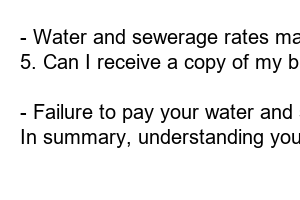상하수도 요금 조회
Water and Sewerage Bill Inquiry: Simplifying the Process
Are you perplexed by your water and sewerage bill? Is deciphering the charges and calculations leaving you scratching your head? If so, you’re not alone. Many individuals find themselves in a state of perplexity when it comes to understanding their water and sewerage bills. However, fear not! In this blog post, we will guide you through the process of inquiring about your water and sewerage bill, ensuring that you can comprehend every aspect without breaking a sweat.
1. What is a Water and Sewerage Bill?
A water and sewerage bill is a monthly statement issued by the water utility company, detailing the charges for the water and sewer services provided to your property. This bill encompasses various components, including water usage charges, sewerage fees, and any additional services availed.
Understanding the Components of Your Bill
Water Usage Charges: These charges are based on the amount of water consumed during the billing period. The rate per unit is set by the utility company and may vary based on factors such as location and peak consumption.
Sewerage Fees: Sewerage fees are calculated based on a percentage of the water consumption, as it is assumed that a portion of the water used will be discharged as wastewater.
Additional Services: Additional services, such as garbage collection or drainage maintenance, may be included in the bill. These charges are separate from the water and sewerage services.
2. How to Read Your Water and Sewerage Bill?
To decipher your water and sewerage bill, start by locating the bill summary section. Here, you will find the billing period dates, meter reading, and previous and current meter readings. Take note of any discrepancies, as they may indicate a potential issue.
Next, you’ll come across a detailed breakdown of the charges, segregated under appropriate headings. Familiarize yourself with these headings to understand the various components and calculations involved.
3. How to Inquire About Your Bill?
If you have any queries or concerns regarding your water and sewerage bill, don’t hesitate to contact your water utility company. They will be able to provide you with a thorough explanation of the charges and assist you in resolving any discrepancies.
Ensure that you have your account number, billing period dates, and meter reading details ready before reaching out to the customer service representative. This will facilitate a quicker and more accurate inquiry.
4. How to Reduce Your Water and Sewerage Bill?
Implementing water-saving measures in your daily routine can significantly reduce your water consumption, subsequently lowering your water and sewerage bill. Simple practices such as fixing leaks, using low-flow fixtures, and collecting rainwater for gardening can go a long way in conserving water and reducing your bill.
5. Common Issues and Solutions
– High water bill: If your water bill appears unusually high, check for leaks, and ensure that no appliances or faucets are left running unnecessarily. If the issue persists, contact your water utility company for further assistance.
– Calculation errors: Mistakes in calculating the water usage or applying incorrect rates can happen. If you suspect errors in your bill, reach out to your water utility company for a reevaluation.
– Abnormal meter readings: Incorrect meter readings can lead to inflated bills. If you notice any irregularities in the meter readings, inform your water utility company immediately for correction.
6. Frequently Asked Questions
1. How often is the water and sewerage bill issued?
– The bill is typically issued monthly, although it may vary depending on your location and utility provider.
2. Can I dispute my water and sewerage bill?
– Yes, you can dispute your bill if you believe there are errors or inconsistencies. Contact your water utility company for further assistance.
3. What should I do if there is a leak on my property?
– If you suspect a leak, promptly repair it to prevent water wastage and subsequent high bills. If needed, seek professional assistance in identifying and fixing the leak.
4. Are water and sewerage rates the same for all regions?
– Water and sewerage rates may vary based on the location and utility provider. Contact your local water utility company for accurate rate information.
5. Can I receive a copy of my bill online?
– Many water utility companies offer an online portal where you can access and download your bill. Check with your provider for online bill access options.
6. What happens if I don’t pay my water and sewerage bill?
– Failure to pay your water and sewerage bill can result in penalties, service disconnections, and potential legal action. It is crucial to address any payment concerns promptly.
In summary, understanding your water and sewerage bill is vital for effective budgeting and ensuring accurate charges. By familiarizing yourself with the components and reaching out to your water utility company for assistance, you can simplify the inquiry process and take control of your water and sewerage expenses. Remember, adopting water-saving practices can not only conserve this valuable resource but also help lower your bill. So, go ahead, take charge, and never be mystified by your bill again!

